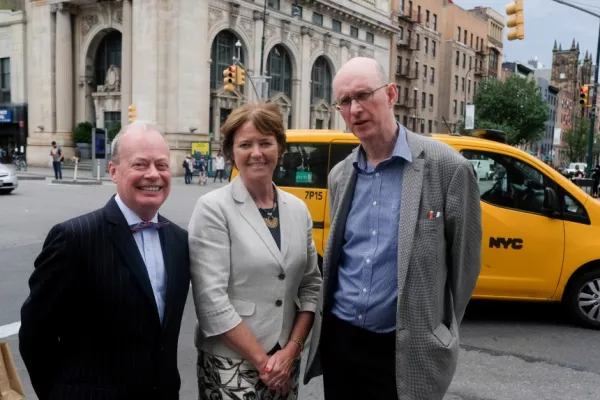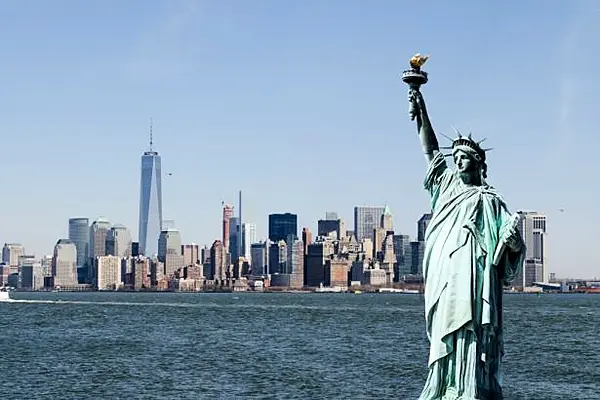Anbang Insurance Group, known for its aborted attempt to buy Starwood Hotels & Resorts Worldwide Inc. in March, is turning its attention from chasing deals to digesting $13.5 billion of overseas acquisitions announced since 2014.
The company will focus on integrating purchases such as South Korea’s Tongyang Life Insurance, Vice Chairman Yao Dafeng said on Tuesday in Beijing, in the first interview by the company’s senior management with international media. While Yao said Anbang will still continue to seek acquisitions, mostly insurers and banks, his comments suggest a deal spree that included buying New York’s iconic Waldorf Astoria Hotel and mounting a $14 billion bid for Starwood might abate.
“We want to build up the existing synergies a bit first, and consider new deals when appropriate opportunities emerge,” Yao said, adding that the insurer’s premium growth remains strong enough to finance new deals. “You can’t just keep buying everyday. You need to also digest and absorb.”
Anbang, founded in 2004, has been at the forefront of a record wave of overseas acquisitions by Chinese companies as the world’s second-largest economy cools. The insurer, which has amassed assets across the U.S., Europe and Asia, is now preparing an initial public offering in Hong Kong of its life insurance operations.
There are signs that some major Chinese acquirers are taking a pause. Fosun Group, whose purchases included Club Med, has slowed its deal pace in the past year as billionaire founder Guo Guangchang switched focus to cutting debt.
Led by Chairman Wu Xiaohui, Anbang has faced calls for more disclosure by Standard & Poor’s Ratings Services and drawn scrutiny for its unconventional dealmaking methods. Wu this year abruptly pulled out of the deal to buy the Starwood hotel chain, which would have been the biggest purchase of a U.S. asset by a Chinese company.
The main reason for that decision was to strictly abide by the company’s “price discipline,” the company said in a statement Tuesday.
Proposed IPO
The proposed IPO is part of efforts by Anbang to better integrate itself into the global community as an “open and transparent” player, said Yao, who is also chairman of the life insurance unit. The company has asked banks to pitch for roles on the deal, people with knowledge of the matter said last month.
Morgan Stanley, Hong Kong’s No. 1 IPO arranger in the past decade, decided to not pitch for a role in the offering, according to people with direct knowledge of the matter, Bloomberg News reported last week. Bankers’ deliberations on whether to work with Anbang have centered on whether the company would provide enough details on its ultimate ownership structure, the people said.
The New York Times reported last week that Anbang is controlled by a group of companies owned by about 100 people with ties to the insurer’s chairman, many of them hailing from Wu’s home county of Pingyang on the eastern Chinese coast.
China ‘Stereotypes’
The report was “not factual,” Yao said. “Anbang is a private company that strictly abides by Chinese laws and regulations. Some people in America always have stereotypes about China and Chinese companies.”
Anbang, which has announced $13.5 billion in overseas deals in the past two years, folded four of the companies it acquired into the life unit last year. They include Tongyang Life, Dutch insurer Vivat, Belgium lender Nagelmackers and insurer Fidea NV, according to the unit’s 2015 annual report. Net income at the consolidated division more than doubled from the previous year to 19.6 billion yuan ($2.9 billion), while assets surged more than sevenfold to 921.6 billion yuan, according to the report.
“Those consolidated numbers are just the technical aspect, and a very small part” of benefits such acquisitions have brought Anbang, Yao said. “From the strategic and market competition point of view, our global deployment is taking shape.”
Some of the acquired companies are already benefiting as Anbang has started started integrating them. Seoul-based Tongyang Life, which Anbang bought last September, posted its best results since its establishment in 1989 in the first half of this year, with premiums income jumping 91 percent mainly thanks to a new pension insurance product designed with Anbang’s help, Yao said.
Amstelveen-based Vivat, bought in July last year, reported a tenfold profit jump for the same period, after management strategies “exported” from Anbang helped reduce costs and improve efficiency, he added.
Anbang still has “very strong reserve strength” for further overseas and domestic investments, with foreign purchases, including both completed and pending deals, accounting for only about 2.8 percent of total assets, compared with the regulatory ceiling of 15 percent, the company said in a statement.
“We’re not simply slowing down,” Yao said, adding Anbang is working to complete all pending acquisitions including that of Fidelity & Guaranty Life in the U.S., announced in November. “We’ll be looking for new ones as we digest.”









